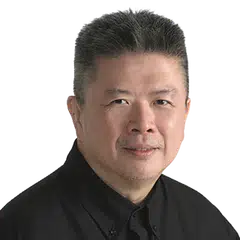Singtel S’pore business units merged but ‘still lots to do’, says S’pore CEO
Sign up now: Get ST's newsletters delivered to your inbox

Backed by the group’s annual budget of $20 million for training and development, Singtel Singapore chief executive officer Ng Tian Chong wants to create a resilient workforce that is used to adapting to change.
PHOTO: SINGTEL
SINGAPORE - With the merger between Singtel Singapore’s consumer and enterprise arms now complete in just over six months, the hard work of streamlining the integrated business will likely continue for at least another 2½ years, its top executive said.
“We have a three-year timeframe to accomplish this multi-phase consolidation,” Singtel Singapore chief executive officer Ng Tian Chong told The Straits Times.
“While our people have settled into their roles, on my part, there’s still a lot to do,” added the former Hewlett-Packard veteran of around 30 years, who was helicoptered in to helm the new entity in June 2023.
The business restructuring is part of a strategic reset to jumpstart growth at Singtel, as well as to be “more agile, competitive and compelling when bringing solutions to market”, group chief executive officer Yuen Kuan Moon had said in April 2023.
That pivot began in 2021, when the telco spun off its information and communications technology and digital services arm NCS, enabling it to expand more quickly into the Asia-Pacific as an autonomous business unit.
In July 2022, the group further decentralised its organisational structure by transferring the management of Optus Enterprise to Australia, where it is the second-largest telco.
While the move gave Optus more operational autonomy and direct accountability, its management has since come under scrutiny for failing to prevent a data breach in September 2022 and a 12-hour network-wide outage in November 2023.
Some eight months earlier, in April 2023, the consolidation of Singtel’s consumer and enterprise business units, together with the setting up of an infrastructure unit called Digital InfraCo, was announced.
All this is taking place as growth in Singtel has flatlined amid rising competition and changing consumer demands.
Notably, the group’s half-year operating revenue to Sept 30, 2023, slipped 3 per cent to $7 billion from the same period the previous year.
At the same time, earnings before interest and taxes (Ebit) or operating profit excluding contributions from associates remained flat at $580 million.
However, this was due largely to the impact of a strong Singapore dollar versus a weak Australian dollar, which had blunted both operating revenue and Ebit. They would have each posted a 1.5 per cent increase otherwise.
While the mobile business, NCS and Digital InfraCo showed sustained growth, Singtel Singapore’s operating revenue was down 3 per cent for the same period, while Ebit declined by 4 per cent.
Singtel’s share price closed one cent lower at $2.38 on Jan 23.
But things should improve moving forward.
Mr Ng said the inefficiencies that resulted from having two parallel business lines in the past are expected to be eliminated now that they have been melded into a unified outfit.
He said the challenge, however, is in identifying areas that have natural synergy and those that do not.
For example, both the retail outlets and call centres can serve the consumer and enterprise segments, but the skill sets of sales staff catering to each segment may not necessarily overlap.

Mr Ng’s goal is to foster a culture that is agile and willing to lean out to take calculated risks.
PHOTO: SINGTEL
Mr Ng likened this to the food business where horizontal functions such as the central kitchen can be merged for greater efficiency, but the cooking process will vary from cuisine to cuisine.
“For Singtel’s horizontal functions, such as information technology, human resources, finance and networks, the group’s overall efficiency should improve when duplication is removed,” he said.
Additional cost savings can be attained from simplifying the organisation, along with its offerings and processes, he noted.
While this saves on cost, the changes must also improve both employee satisfaction and customer experience.
To gauge how employees are doing, the company gathers feedback and uses engagement scores to evaluate how the 5,000 staff, of more than 100 nationalities and with an average age of 39 years, are coping with the changes.
“We know that changing mindsets and attitudes takes time, but the engagement scores we’ve seen so far are good,” Mr Ng said.
Backed by the group’s annual budget of $20 million for training and development, Mr Ng wants to create a resilient workforce that is used to adapting to change.
“This is because technology changes continually and how we add value will also evolve in tandem,” he said.
His goal is to foster a culture that is agile and willing to lean out to take calculated risks.
The aim is to make Singtel the first port of call for customers, regardless of whether they are individual consumers or small and medium-sized businesses.
“For this to happen, we have to take an outside-in view, providing them with frictionless services. At the end of the day, we want to be in the top quartile of leading global telcos,” said Mr Ng.
Commenting on his leadership style, he said it was no longer good enough to be just a conductor of an orchestra.
“With unpredictability a given constant amid unfolding crises, leaders cannot simply follow a script,” he said.
“I prefer to see myself as the leader of a jazz band, who can improvise and can still get things done when there isn’t a music score to play from.”



